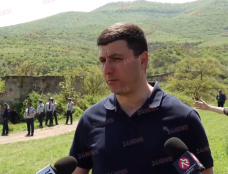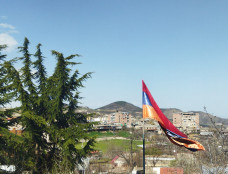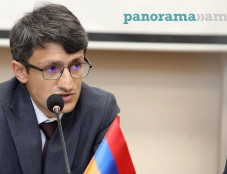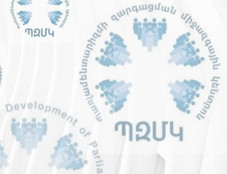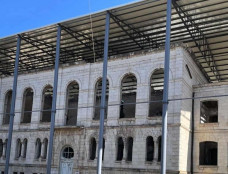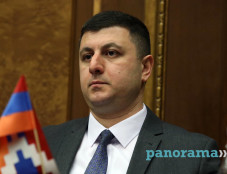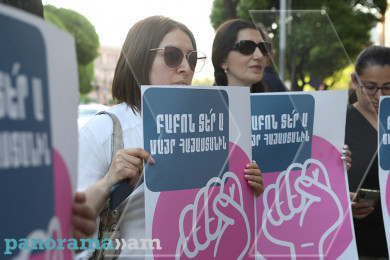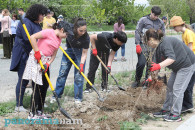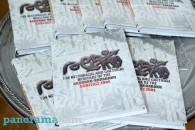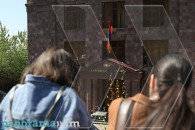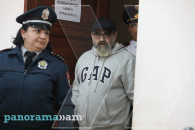
26 years after genocide in Baku: “They just threw that young Armenian under train”
Panorama.am has already reported that a collection book Baku Tragedy: Eyewitness Accounts is to be published in the frameworks of the project Ordinary Genocide. It will include the interviews of about 50 refugees currently living in the US who speak about their memories. ‘A Century-Long Genocide. Black January of Baku, a film, whose presentation took place a year ago, was made based on those accounts.
To commemorate the 26th anniversary of the genocide of the Armenians in Baku, Panorama.am goes on publishing chapters from the future book, provided to the website by Marina Grigoryan, the manager of the project an Ordinary Genocide.
Oleg Petrosyan. Lived in Baku, first in Montino, then moved to the suburb Akhmedli.
I had lived in Baku since 1958, studied at school No 200 on Inglab Street not far from the Armenian cemetery. I worked in the experimental-empiric workshop of Baku industrial union ‘Radiostroenie’ (people used to call it ‘Radiozavod’ [Factory of Radio]). When the events in Sumgait took place, it was a shock. Notably, it was a mutual shock, rather than only for the Armenians.
I learnt about those events at work. My place was near a glass partition separating the workshop director’s office. Babayev Yashar, one of the engineer-technologists, lived in Sumgait. He was late for work that day, and when he turned up, three of the foremen and the workshop director suddenly locked up in that same small room and started discussing something very hotly. And I heard everything.
Babayev was telling them about what was going on it Sumgait. He was speaking about murders, robbery, about how some were hit with axe, and others were burnt. Even for the Azerbaijanis, it was something unbelievable, something beyond their understanding. But that moment divided our life into before and after. It’s true, at the beginning the Azerbaijanis – neighbours, fellow workers, or just acquaintances – experienced a certain feeling of guiltiness. This is a fact. But then everything changed. And the Baku events were signalled at a meeting of the Supreme Council of the USSR on 18 June 1988 when Gorbachev rudely cut Henrikh Igityan’s speech and said, “And do you know what Genocide is?” And added, “Have you ever thought what can happen to the two hundred thousand Baku residents of Armenian nationality?”
And then the protests and demonstrations started on the square. A highest tension could be felt in the city. I concretely faced that on 2 December 1988 when it was not possible to work anymore. We, the Armenians, were summoned to the party bureau and offered to go on a vacation. They said this would all probably end soon. My wife worked at the House of the Fleet Officers and was to register her vacation there. She took our little child to work with her. And I went after them. As I arrived at the city centre, I saw countless people by the Railway Administration. Everyone was running here and there, the buses did not work, small private buses (alabashas) were packed with people. I somehow sat down and felt that a secrecy was already needed. We reached Bailovo. Everyone was talking about one and the same thing, “Now, we’ll soon drive them all out, all the flats will be ours,” and so on.
I picked them up. The three of us went down to the subway at about eight in the evening. We waited for the train and got in. My wife and son sat by the last door and I stood in front of them by the window. An about 50-year-old adult man of quite decent appearance was sitting next to them. The waggon was packed. And suddenly a group of youngsters burst inside from the very first door – the one farthest from us – on one of the stations. They were shouting, “Here, you, Baku residents, you’re sitting here, while we are being slaughtered there.” They were showing with hands on themselves how they were being killed, and then said, “Prepare your passports, let’s see who the Armenians here are.” Where could one hide in that closed place? At that time, the train stopped at Narimanov Station. I was standing with my face towards the glass looking at the platform. All of a sudden, a young man rushed out of the same first door walking quickly toward me along the train…
Even after 26 years, that face still remains in front of my eyes – a young handsome guy, with some resemblance to young Khoren Abrahamyan from the film “The Song of the First Love.” He was walking quickly, almost running, and a clew of bodies – at least 20 people – was coming behind him. They caught up with him right in front of my eyes and surrounded him. The guy’s head disappeared and they started trampling on him. Then it was like a newsreel: announcement was made, the doors closed and our train started off. Meanwhile, the signal of the train going to the other side was given out. And, as if on order, the crowd instantly rushed to the opposite side, right to the edge of the platform…
I think they just threw that young Armenian under the train. Only thinking about that has been torturing me for all these years: he didn’t go back home that evening. And his family probably do not even know what happened to him. Maybe they even hope that he was just lost…
I stood stunned, under the influence of what I saw (my wife was sitting with her back to the window and didn’t see anything) and thought in fever what to do. Those people were moving along the waggon checking passports in search of Armenians. They were getting closer to us. The only thing that came to my mind was to get out. They were already some three steps away from us. The waggon was overcrowded. The train came up to the stop and I said ‘we’re getting out.’ I let the child go first, and my wife after him, as we had to force our way through the crowd of the passengers. Those people were already in a metre from me. And then an old Russian woman turned to them, “Sonnies, what are you doing? What do you want?” In response, they said, “Shut up, mommy, no one touches you.” The station. The doors opened. We were already in half a metre from the exit, when suddenly the ‘decent man’ sitting next to my wife shouted, “Armenians! Beat them!” The crowd instinct and the psychological moment of those times, of that mass schizophrenia, instantly came into action. Hits showered on our heads. The waggon doors opened but the crowd was tightly standing on our way. Where could we hide? It was not that simple to get out, crowd wanted to break into the waggon, they were hitting from all the sides. My eyeglasses broke into pieces, the hat flew somewhere… I set my foot somewhere back, maybe against someone’s belly, then my second foot went there, and, moving the crowd aside like a piston, I pushed my wife to the door. They let her and my son out. After all, they were a woman and a small boy. But I fell down as I had no point of support any more.
The hits continued dropping on me. Stood I vertically, I wouldn’t get out of there. Finding myself on the floor among legs, where there was a little more room than above, I just scrambled between the legs, crawling out to the platform… None of those beating and persecuting us could come out after me. The doors closed and the train drove off, while the three of us immediately hid behind the pillars. I told them, stand, don’t breathe, don’t move, no sound… Fortunately, our son didn’t even cry for the whole time. We hid. Two Russian officers were standing not far from us, in four or five metres. My wife said, “I’ll go to them…” I said, “Stop, don’t draw attention.” Some people were still remaining there. She didn’t listen to me, went and said, “Help us, please, we were about to be killed.” And they told her, go upstairs, a militia station is up there. Naturally, we didn’t go anywhere. We stood by that pillar some thirty minutes, while several trains drove by and more or less empty ones came. We went into the waggon calmly, reached our station and got home on a microbus from there. And that’s all. We never went out until my father and his friends brought us train tickets for 7 December 1988.
For all that period, we were constantly told on phone about burnt cars, beaten people… My friend came after us on 7 December and drove us to the station. The station was cordoned off. No one was allowed to go to the platform but the Armenians. My friend tried to come along with me, the militia stopped him, but he said he would not leave until he seated us in the roomette. He burst in and seated us. There were Soviet Army soldiers in the waggon. This is how we were taken to Yerevan…
I went back to Baku in 1989, on those very days. After a year, we thought things had calmed down over there and we had to see about our things, our flat. I flew there, started to deal with all that stuff. I turned on the TV and watched. Enraged crowds, Vezirov speaking trying to calm them down, he said the congress [the Congress of People's Deputies of the USSR in Moscow] would soon begin, how will I look into their eyes? In a word, the situation was dreadful as before, and I think what happened in January of 1990 could happen in December 1989, but they were kept back by the fear that they would have to go to the Moscow Congress immediately after the pogroms.
However, it was not for long, as it turned out. This time, we were again taken to the airport in January 1990, and only there did we learn that pogroms had been going on there for the third day already. There were piles of ashes on the places of fires right there, in the airport hall. They said Armenians had been beaten there, their things had been seized from them and they had been burnt. I saw those traces of the scenes of fire with my own eyes… But anyway, we had to sit there waiting for the planes, though there was little hope we could get out. We just had no place to go back. We had to wait for ten hours, then the flight to Sverdlovsk, I think, was brought back specially for taking the Armenians. The commander of the plane literally drove so many people into it that we were flying like in a bus, tightly standing above the heads of those sitting. This is how I managed to flee from Baku for the second time.
In-joke or with bitterness, I call my family hereditary refugees. My grandparents, both on dad and mom’s side, were originally from Kars. They had to take a refuge from there in the years of the Genocide in 1915-1916. Mom’s parents settled in Maykop, dad’s in Krasnodar. In 1950, father’s family was expelled from Krasnodar. He was only 16 by then. They were exiled to Kostanay, Kazakhstan, where they lived in some remote village until they were allowed to return to Yerevan in 1946. This is how it was that we are all refugees. Grandmother from the first generation, father from the second, me from the third, and my children are refugees of the fourth generation.
A mass pogrom of Armenian population was committed in Baku from 13 to 19 January 1990 as a culmination of the genocide of the Armenians in Azerbaijan unfolded between 1988 and 1990. After the Sumgait pogroms (26-29 February 1988), persecutions, beatings, particularly cruel killings, public mockeries, pogroms of separate flats, seizure of property, forcible expulsions and illegal dismissals of Armenians started in Baku. Only some 35 or 40 thousand Armenians of the community of 250 thousand remained in Baku by January 1990; they were mainly disabled people, old and sick people and the relatives looking after them. The pogroms took an organised, targeted and mass nature since 13 January 1990. A large amount of evidence exists about the atrocities and killings committed with exceptional cruelty, including gang rapes, burnings of people alive, throwing people out of balconies of higher floors, dismemberments and beheadings.
The exact number of the victims of the genocide of the Armenians in Baku still remains unknown. According to different sources, between 150 and 400 people were murdered, and hundreds were left disabled. The pogroms went on for a week amid a total inaction of the authorities of Azerbaijan and the USSR, as well as the internal troops and the large Baku garrison of the Soviet Army. Those who managed to avoid death were forced into deportation. The Soviet troops were deployed to set order in Baku only on 20 January 1990.
For more detail, visit KarabakhRecords http://karabakhrecords.info/ru/home-3/.
Panorama.am has already reported that a collection book Baku Tragedy: Eyewitness Accounts is to be published in the frameworks of the project Ordinary Genocide. It will include the interviews of about 50 refugees currently living in the US who speak about their memories. ‘A Century-Long Genocide. Black January of Baku,’ https://www.youtube.com/watch?v=82IOf6UEKUc a film, whose presentation took place a year ago, was made based on those accounts.
To commemorate the 26th anniversary of the genocide of the Armenians in Baku, Panorama.am goes on publishing chapters from the future book, provided to the website by Marina Grigoryan, the manager of the project an Ordinary Genocide.
Oleg Petrosyan. Lived in Baku, first in Montino, then moved to the suburb Akhmedli.
I had lived in Baku since 1958, studied at school No 200 on Inglab Street not far from the Armenian cemetery. I worked in the experimental-empiric workshop of Baku industrial union ‘Radiostroenie’ (people used to call it ‘Radiozavod’ [Factory of Radio]). When the events in Sumgait took place, it was a shock. Notably, it was a mutual shock, rather than only for the Armenians.
I learnt about those events at work. My place was near a glass partition separating the workshop director’s office. Babayev Yashar, one of the engineer-technologists, lived in Sumgait. He was late for work that day, and when he turned up, three of the foremen and the workshop director suddenly locked up in that same small room and started discussing something very hotly. And I heard everything.
Babayev was telling them about what was going on it Sumgait. He was speaking about murders, robbery, about how some were hit with axe, and others were burnt. Even for the Azerbaijanis, it was something unbelievable, something beyond their understanding. But that moment divided our life into before and after. It’s true, at the beginning the Azerbaijanis – neighbours, fellow workers, or just acquaintances – experienced a certain feeling of guiltiness. This is a fact. But then everything changed. And the Baku events were signalled at a meeting of the Supreme Council of the USSR on 18 June 1988 when Gorbachev rudely cut Henrikh Igityan’s speech and said, “And do you know what Genocide is?” And added, “Have you ever thought what can happen to the two hundred thousand Baku residents of Armenian nationality?”
And then the protests and demonstrations started on the square. A highest tension could be felt in the city. I concretely faced that on 2 December 1988 when it was not possible to work anymore. We, the Armenians, were summoned to the party bureau and offered to go on a vacation. They said this would all probably end soon. My wife worked at the House of the Fleet Officers and was to register her vacation there. She took our little child to work with her. And I went after them. As I arrived at the city centre, I saw countless people by the Railway Administration. Everyone was running here and there, the buses did not work, small private buses (alabashas) were packed with people. I somehow sat down and felt that a secrecy was already needed. We reached Bailovo. Everyone was talking about one and the same thing, “Now, we’ll soon drive them all out, all the flats will be ours,” and so on.
I picked them up. The three of us went down to the subway at about eight in the evening. We waited for the train and got in. My wife and son sat by the last door and I stood in front of them by the window. An about 50-year-old adult man of quite decent appearance was sitting next to them. The waggon was packed. And suddenly a group of youngsters burst inside from the very first door – the one farthest from us – on one of the stations. They were shouting, “Here, you, Baku residents, you’re sitting here, while we are being slaughtered there.” They were showing with hands on themselves how they were being killed, and then said, “Prepare your passports, let’s see who the Armenians here are.” Where could one hide in that closed place? At that time, the train stopped at Narimanov Station. I was standing with my face towards the glass looking at the platform. All of a sudden, a young man rushed out of the same first door walking quickly toward me along the train…
Even after 26 years, that face still remains in front of my eyes – a young handsome guy, with some resemblance to young Khoren Abrahamyan from the film “The Song of the First Love.” He was walking quickly, almost running, and a clew of bodies – at least 20 people – was coming behind him. They caught up with him right in front of my eyes and surrounded him. The guy’s head disappeared and they started trampling on him. Then it was like a newsreel: announcement was made, the doors closed and our train started off. Meanwhile, the signal of the train going to the other side was given out. And, as if on order, the crowd instantly rushed to the opposite side, right to the edge of the platform…
I think they just threw that young Armenian under the train. Only thinking about that has been torturing me for all these years: he didn’t go back home that evening. And his family probably do not even know what happened to him. Maybe they even hope that he was just lost…
I stood stunned, under the influence of what I saw (my wife was sitting with her back to the window and didn’t see anything) and thought in fever what to do. Those people were moving along the waggon checking passports in search of Armenians. They were getting closer to us. The only thing that came to my mind was to get out. They were already some three steps away from us. The waggon was overcrowded. The train came up to the stop and I said ‘we’re getting out.’ I let the child go first, and my wife after him, as we had to force our way through the crowd of the passengers. Those people were already in a metre from me. And then an old Russian woman turned to them, “Sonnies, what are you doing? What do you want?” In response, they said, “Shut up, mommy, no one touches you.” The station. The doors opened. We were already in half a metre from the exit, when suddenly the ‘decent man’ sitting next to my wife shouted, “Armenians! Beat them!” The crowd instinct and the psychological moment of those times, of that mass schizophrenia, instantly came into action. Hits showered on our heads. The waggon doors opened but the crowd was tightly standing on our way. Where could we hide? It was not that simple to get out, crowd wanted to break into the waggon, they were hitting from all the sides. My eyeglasses broke into pieces, the hat flew somewhere… I set my foot somewhere back, maybe against someone’s belly, then my second foot went there, and, moving the crowd aside like a piston, I pushed my wife to the door. They let her and my son out. After all, they were a woman and a small boy. But I fell down as I had no point of support any more.
Тhe hits continued dropping on me. Stood I vertically, I wouldn’t get out of there. Finding myself on the floor among legs, where there was a little more room than above, I just scrambled between the legs, crawling out to the platform… None of those beating and persecuting us could come out after me. The doors closed and the train drove off, while the three of us immediately hid behind the pillars. I told them, stand, don’t breathe, don’t move, no sound… Fortunately, our son didn’t even cry for the whole time. We hid. Two Russian officers were standing not far from us, in four or five metres. My wife said, “I’ll go to them…” I said, “Stop, don’t draw attention.” Some people were still remaining there. She didn’t listen to me, went and said, “Help us, please, we were about to be killed.” And they told her, go upstairs, a militia station is up there. Naturally, we didn’t go anywhere. We stood by that pillar some thirty minutes, while several trains drove by and more or less empty ones came. We went into the waggon calmly, reached our station and got home on a microbus from there. And that’s all. We never went out until my father and his friends brought us train tickets for 7 December 1988.
For all that period, we were constantly told on phone about burnt cars, beaten people… My friend came after us on 7 December and drove us to the station. The station was cordoned off. No one was allowed to go to the platform but the Armenians. My friend tried to come along with me, the militia stopped him, but he said he would not leave until he seated us in the roomette. He burst in and seated us. There were Soviet Army soldiers in the waggon. This is how we were taken to Yerevan…
I went back to Baku in 1989, on those very days. After a year, we thought things had calmed down over there and we had to see about our things, our flat. I flew there, started to deal with all that stuff. I turned on the TV and watched. Enraged crowds, Vezirov speaking trying to calm them down, he said the congress [the Congress of People's Deputies of the USSR in Moscow] would soon begin, how will I look into their eyes? In a word, the situation was dreadful as before, and I think what happened in January of 1990 could happen in December 1989, but they were kept back by the fear that they would have to go to the Moscow Congress immediately after the pogroms.
However, it was not for long, as it turned out. This time, we were again taken to the airport in January 1990, and only there did we learn that pogroms had been going on there for the third day already. There were piles of ashes on the places of fires right there, in the airport hall. They said Armenians had been beaten there, their things had been seized from them and they had been burnt. I saw those traces of the scenes of fire with my own eyes… But anyway, we had to sit there waiting for the planes, though there was little hope we could get out. We just had no place to go back. We had to wait for ten hours, then the flight to Sverdlovsk, I think, was brought back specially for taking the Armenians. The commander of the plane literally drove so many people into it that we were flying like in a bus, tightly standing above the heads of those sitting. This is how I managed to flee from Baku for the second time.
In-joke or with bitterness, I call my family hereditary refugees. My grandparents, both on dad and mom’s side, were originally from Kars. They had to take a refuge from there in the years of the Genocide in 1915-1916. Mom’s parents settled in Maykop, dad’s in Krasnodar. In 1950, father’s family was expelled from Krasnodar. He was only 16 by then. They were exiled to Kostanay, Kazakhstan, where they lived in some remote village until they were allowed to return to Yerevan in 1946. This is how it was that we are all refugees. Grandmother from the first generation, father from the second, me from the third, and my children are refugees of the fourth generation.
A mass pogrom of Armenian population was committed in Baku from 13 to 19 January 1990 as a culmination of the genocide of the Armenians in Azerbaijan unfolded between 1988 and 1990. After the Sumgait pogroms (26-29 February 1988), persecutions, beatings, particularly cruel killings, public mockeries, pogroms of separate flats, seizure of property, forcible expulsions and illegal dismissals of Armenians started in Baku. Only some 35 or 40 thousand Armenians of the community of 250 thousand remained in Baku by January 1990; they were mainly disabled people, old and sick people and the relatives looking after them. The pogroms took an organised, targeted and mass nature since 13 January 1990. A large amount of evidence exists about the atrocities and killings committed with exceptional cruelty, including gang rapes, burnings of people alive, throwing people out of balconies of higher floors, dismemberments and beheadings.
The exact number of the victims of the genocide of the Armenians in Baku still remains unknown. According to different sources, between 150 and 400 people were murdered, and hundreds were left disabled. The pogroms went on for a week amid a total inaction of the authorities of Azerbaijan and the USSR, as well as the internal troops and the large Baku garrison of the Soviet Army. Those who managed to avoid death were forced into deportation. The Soviet troops were deployed to set order in Baku only on 20 January 1990.
For more detail, visit KarabakhRecords http://karabakhrecords.info/ru/home-3/.
Related news
- 26 years after genocide in Baku: “Someone informed pogromers that young Armenian woman hid in that house, and they came after me…”
- ‘History repeats itself…’ ‘A Century-Long Genocide. Black January of Baku’ film screened in Richmond
Newsfeed
Videos






